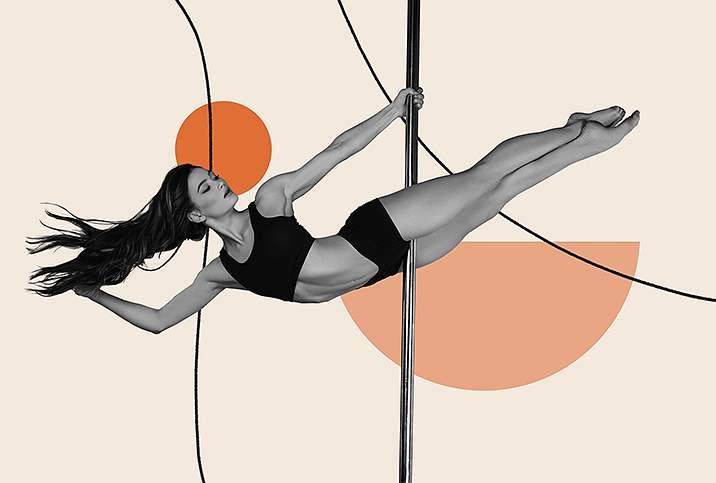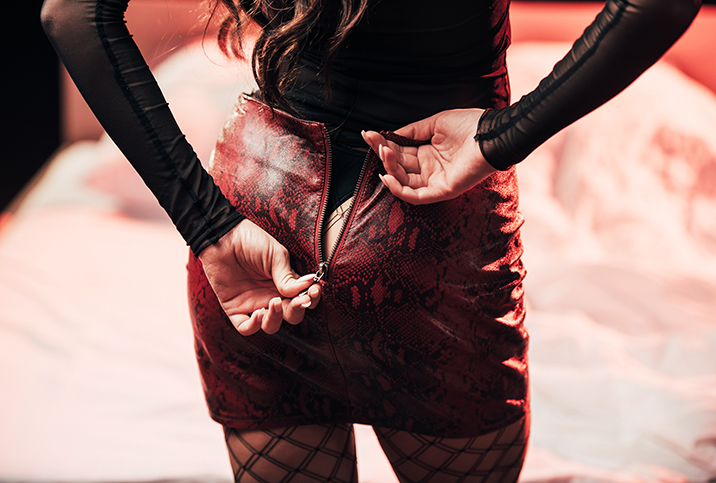Diary of a Sex Worker: Faye Describes the Reality of Stripping

Stripping is a profession fraught with many meanings. For some, it symbolizes the degrading, patriarchal male gaze, re-creating an age-old cultural script where men ogle women and women perform for men. For others, it represents a way for women to express themselves sexually, embrace their bodies and free themselves from social constraints.
Faye, a 28-year-old law student living in Southern California, has had experiences all over this spectrum in the seven years she's worked as a stripper. Faye makes most of her money dancing, though she added occasional escorting and OnlyFans to her repertoire when clubs closed during the pandemic.
Over an email exchange, we discussed what she likes and doesn't like about her profession, what makes it empowering, as well as what makes it difficult and how she hopes to see perceptions of it change.
How did you first begin doing sex work?
I first began dancing when I was about 20 or 21 years old. At the time, I was going through a major life transition from quitting my full-time credit union job to becoming a full-time community college student. I was miserable with the mundane 9-to-5 life and made the decision to return to school to receive a degree. On a separate note, I had been performing modern and contemporary dance shows since the age of 18 at this same community college. The next natural step for me was to explore stripping, since I already had performing experience.
I discussed this with one of the community college dancers, Liza, who mentioned that she had experience stripping and was considering going back to stripping in order to pay for her social work master's program. Liza really showed me the ropes and took me under her wing during this process. I applied for my license, with Liza's help, and the rest was history. I have been dancing ever since.
Did you have any conflicting feelings about it at the time?
So many! I was born and raised in a traditional Catholic household, so Catholic guilt was an issue that definitely sparked an internal conflict as soon as I began dancing. I think that was, in part, my lack of self-confidence and constant worry of how others would perceive me if they found out I was a dancer. It has taken me many years to come to terms with my sexual expression and my ability to use it as a form of liberation. As I have gotten older and have had more experience dancing, my interpretation of what dancing means is fluid and forever shifting.
How have your views on sex work evolved after taking part in it yourself?
My views on sex work have evolved in a way that cannot be understood until you have done the job. It wasn't until I was there with a fucked-up knee, a strained hip flexor, legs full of bruises, or a bad night leaving the club feeling negative and crying in my car for an hour, that I understood how taxing sex work was.
How has sex work helped you love yourself?
Dancing has given me the blessing of self-love in so many different ways. There are head-to-toe mirrors on stage that quite literally force you to take an honest look at yourself, your body and movement every time you perform on stage. This self-reflection, in every sense of the word, has taught me to love myself in my entirety. It has been such a wonderful journey exploring myself and being able to practice that self-love, while simultaneously having my flaws reflecting back at me.
What does a rough night look like?
"Rough nights" are what I refer to as nights where I leave the club with negative money or nights that were not worth sacrificing my night's rest over. Every club has a house fee and a required tip-out, and if you do not meet your "goal," then you will likely get fired from the club. Most house fees are around $40 to $200, not including about a 30 percent tip-out fee divided among the DJ, the bouncer and the manager. Additionally, you have to tip out whoever is walking you out because they are ensuring your safety when leaving the club at the early hours of the morning.
So when I mention "rough nights," I mean nights that were not worth the effort. These nights are the crippling, stressful ones that people forget to mention when glamorizing being a sex worker. These are nights that make me question my worth and will have me crying in the shower while I look at my bruised legs and fucked-up feet, thinking, This is only temporary. Do what you need to do.
What do you wish people understood about sex work?
I wish people would respect all types of sex work with equity. Most importantly, I wish people understood the severity of the risks that Black, Brown and Indigenous sex workers experience every single night they work. It is a blessing every time I make it home safely.
What policies around sex work do you wish would change?
Labor laws in reference to sex work. Permit prices for adult entertaining in Southern California are through the roof! The licensing process itself, in California, is extremely expensive and tedious. This independent contractor permit—adult entertainer license (a card that every dancer, in most major cities, needs to apply for and pay for in order to dance at a strip club)—needs to be renewed annually and runs anywhere between $400 and $500, depending on the renewal date. It should be noted that of these fees, $329 are police department fees, leaving the remaining as county licensing fees. The process also requires a livescan, which is an additional fee. Liza really walked me through this complicated process when I first began dancing.
Anything else you'd like to add?
Yes, I just want to give a shout-out to my girls Dallas, Dakota, Liza, Anabelle, Kelly and LaLa, who taught me how to hustle. Thank you for the laughs, the tears, the shots and everything.
This interview has been edited for length and clarity.


















